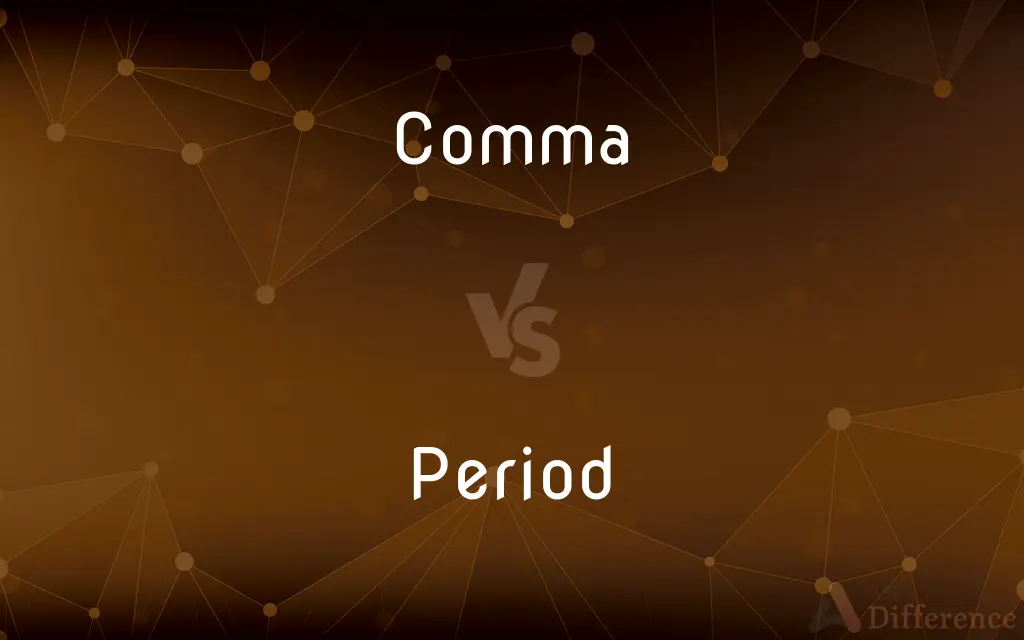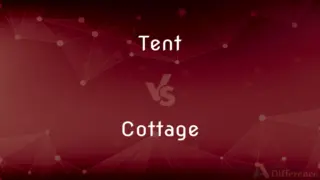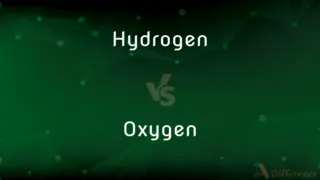Comma vs. Period — What's the Difference?
By Tayyaba Rehman — Published on August 27, 2023
Comma and period are punctuation marks; the comma indicates a pause while the period signifies an end.

Difference Between Comma and Period
Table of Contents
ADVERTISEMENT
Key Differences
A comma, represented by ",", serves various functions in written English, among which is to denote a slight pause in a sentence. On the other hand, a period, marked as ".", denotes the end of a sentence or statement.
While commas might be used to separate items in a list or clarify the meaning of a sentence, periods are employed to conclusively terminate statements.
The use of a comma can prevent ambiguity in a sentence, ensuring that the reader understands the writer's intent. Conversely, a period provides a clear signal that a thought or idea has been concluded.
While the comma offers a brief pause and can aid in the clarity of a sentence, the period acts as a full stop, signifying that the reader should pause before moving on to the next statement.
Comparison Chart
Function
Indicates a pause
Signifies the end of a sentence
ADVERTISEMENT
Representation
","
"."
Usage
Separates items in a list
Terminates statements
Clarity
Prevents ambiguity
Provides a clear end to a thought
Frequency
Can be used multiple times in a sentence
Typically used once at the end of a statement
Compare with Definitions
Comma
A comma is a punctuation mark indicating a pause.
She bought apples, oranges, and grapes.
Period
A period is a punctuation mark that denotes the end of a sentence.
She went to the market.
Comma
Commas are used to separate items in a list.
He enjoys reading, writing, and hiking.
Period
Periods are used to abbreviate certain words.
Mr. Smith is attending the meeting.
Comma
The comma can prevent ambiguity in a sentence.
Let's eat, Grandma.
Period
It indicates a full stop in thought.
This is the end.
Comma
Commas are used to set off non-essential clauses.
The book, published last year, is a best-seller.
Period
A punctuation mark ( . ) indicating a full stop, placed at the end of declarative sentences and other statements thought to be complete, and after many abbreviations.
Comma
The comma , is a punctuation mark that appears in several variants in different languages. It has the same shape as an apostrophe or single closing quotation mark (’) in many typefaces, but it differs from them in being placed on the baseline of the text.
Period
Periods separate sentences in a paragraph.
I love ice cream. It's delicious.
Comma
It can also indicate a direct address.
Thank you, sir, for your help.
Period
(figurative) A decisive end to something; a stop.
Comma
A pause or separation; a caesura.
Period
(euphemism) Female menstruation; an episode of this.
When she is on her period, she prefers not to go swimming.
Comma
(figurative) A brief interval.
Period
One or more additional intervals to decide a tied game, an overtime period.
They won in the first overtime period.
Comma
A character or point [,] marking the smallest divisions of a sentence, written or printed.
Period
(obsolete) A specific moment during a given process; a point, a stage.
Comma
A small interval (the difference between a major and minor half step), seldom used except by tuners.
Period
The punctuation mark “.” (indicating the ending of a sentence or marking an abbreviation).
Comma
A punctuation mark (,) used to indicate the separation of elements within the grammatical structure of a sentence
Period
Each of the intervals, typically three, of which a game is divided.
Gretzky scored in the last minute of the second period.
Comma
Anglewing butterfly with a comma-shaped mark on the underside of each hind wing
Period
The termination or completion of a revolution, cycle, series of events, single event, or act; hence, a limit; a bound; an end; a conclusion.
So spake the archangel Michael; then paused,As at the world's great period.
Evils which shall never end till eternity hath a period.
This is the period of my ambition.
Comma
(Grammar) A punctuation mark ( , ) used to indicate a separation of ideas or of elements within the structure of a sentence.
Period
An interval of time characterized by the occurrence of a certain condition, event, or phenomenon
A period of economic prosperity.
Comma
Any of several nymphalid butterflies of the genus Polygonia having wings with irregularly notched edges and a small comma-shaped marking on the underside of the hind wing.
Period
An interval of time characterized by the prevalence of a specified culture, ideology, or technology
Artifacts of the pre-Columbian period.
Comma
(typography) The punctuation mark ⟨,⟩ used to indicate a set of parts of a sentence or between elements of a list.
Period
An interval regarded as a distinct evolutionary or developmental phase
Picasso's early career is divided into his blue period and rose period.
Comma
A similar-looking subscript diacritical mark.
Period
(Geology) A unit of time, longer than an epoch and shorter than an era.
Comma
(entomology) Any of various nymphalid butterflies of the genus Polygonia, having a comma-shaped white mark on the underwings, especially Polygonia c-album and Polygonia c-aureum of North Africa, Europe, and Asia.
Period
Any of the divisions of the academic day.
Comma
(music) A difference in the calculation of nearly identical intervals by different ways.
Period
Sports & Games A division of the playing time of a game.
Comma
(rhetoric) In Ancient Greek rhetoric, a short clause, something less than a colon, originally denoted by comma marks. In antiquity it was defined as a combination of words having no more than eight syllables in all. It was later applied to longer phrases, e.g. the Johannine comma.
Period
See menstrual period.
Comma
(genetics) A delimiting marker between items in a genetic sequence.
Period
A point or portion of time at which something is ended; a completion or conclusion.
Period
The full pause at the end of a spoken sentence.
Period
A sentence of several carefully balanced clauses in formal writing.
Period
An analogous unit or division of classical Greek or Latin prose.
Period
(Music) A group of two or more phrases within a composition, often made up of 8 or 16 measures and terminating with a cadence.
Period
The least interval in the range of the independent variable of a periodic function of a real variable in which all possible values of the dependent variable are assumed.
Period
A group of digits separated by commas in a written number.
Period
The number of digits that repeat in a repeating decimal. For example, 1/7 = 0.142857142857 ... has a six-digit period.
Period
A period of time in history seen as a single coherent entity; an epoch, era.
Food rationing continued in the post-war period.
Period
The length of time during which the same characteristics of a periodic phenomenon recur, such as the repetition of a wave or the rotation of a planet.
Period
Each of the divisions into which a school day is split, allocated to a given subject or activity.
I have math class in second period.
Period
The length of time for a disease to run its course.
Period
An end or conclusion; the final point of a process etc.
Period
(rhetoric) A complete sentence, especially one expressing a single thought or making a balanced, rhythmic whole.
Period
(genetics) A Drosophila gene, the gene product of which is involved in regulation of the circadian rhythm.
Period
(music) Two phrases (an antecedent and a consequent phrase).
Period
(math) The length of an interval over which a periodic function, periodic sequence or repeating decimal repeats; often the least such length.
Period
(archaic) End point, conclusion.
Period
Designating anything from a given historical era. en
A period car
A period TV commercial
Period
Evoking, or appropriate for, a particular historical period, especially through the use of elaborate costumes and scenery.
Period
That's final; that's the end of the matter (analogous to a period ending a sentence); end of story.
I know you don't want to go to the dentist, but your teeth need to be checked, period!
Period
To come to a period; to conclude.
Period
To put an end to.
Period
A portion of time as limited and determined by some recurring phenomenon, as by the completion of a revolution of one of the heavenly bodies; a division of time, as a series of years, months, or days, in which something is completed, and ready to recommence and go on in the same order; as, the period of the sun, or the earth, or a comet.
Period
A stated and recurring interval of time; more generally, an interval of time specified or left indefinite; a certain series of years, months, days, or the like; a time; a cycle; an age; an epoch; as, the period of the Roman republic.
How by art to make plants more lasting than their ordinary period.
Period
One of the great divisions of geological time; as, the Tertiary period; the Glacial period. See the Chart of Geology.
Period
A complete sentence, from one full stop to another; esp., a well-proportioned, harmonious sentence.
Periods are beautiful when they are not too long.
Period
The punctuation point [.] that marks the end of a complete sentence, or of an abbreviated word.
Period
One of several similar sets of figures or terms usually marked by points or commas placed at regular intervals, as in numeration, in the extraction of roots, and in circulating decimals.
Period
The time of the exacerbation and remission of a disease, or of the paroxysm and intermission.
Period
A complete musical sentence.
Period
To put an end to.
Period
To come to a period; to conclude. [Obs.] "You may period upon this, that," etc.
Period
An amount of time;
A time period of 30 years
Hastened the period of time of his recovery
Picasso's blue period
Period
One of three periods of play in hockey games
Period
A stage in the history of a culture having a definable place in space and time;
A novel from the Victorian period
Period
The interval taken to complete one cycle of a regularly repeating phenomenon
Period
The monthly discharge of blood from the uterus of nonpregnant women from puberty to menopause;
The women were sickly and subject to excessive menstruation
A woman does not take the gout unless her menses be stopped
The semen begins to appear in males and to be emitted at the same time of life that the catamenia begin to flow in females
Period
A punctuation mark (.) placed at the end of a declarative sentence to indicate a full stop or after abbreviations;
In England they call a period a stop
Period
A unit of geological time during which a system of rocks formed;
Ganoid fishes swarmed during the earlier geological periods
Period
The end or completion of something;
Death put a period to his endeavors
A change soon put a period to my tranquility
Period
They are used to conclude declarative statements.
The world is round.
Period
Physics & Astronomy The time interval between two successive occurrences of a recurrent event or phases of an event; a cycle
The period of a satellite's orbit.
Period
A metrical unit of quantitative verse consisting of two or more cola.
Period
(Chemistry) A sequence of elements arranged in order of increasing atomic number and forming one of the horizontal rows in the periodic table.
Period
Of, belonging to, or representing a certain historical age or time
A period piece.
Period furniture.
Period
Used to emphasize finality, as when expressing a decision or an opinion
You're not going to the movies tonight, period!.
Period
A length of time.
There was a period of confusion following the announcement.
You'll be on probation for a six-month period.
Period
A section of an artist's, writer's (etc.) career distinguished by a given quality, preoccupation etc.
This is one of the last paintings Picasso created during his Blue Period.
Period
(chemistry) A row in the periodic table of the elements.
Period
(geology) A geochronologic unit of millions to tens of millions of years; a subdivision of an era, and subdivided into epochs.
These fossils are from the Jurassic period.
Common Curiosities
What is a period?
A period is a punctuation mark denoting the end of a sentence.
What is a comma?
A comma is a punctuation mark indicating a pause in a sentence.
Can a comma be used multiple times in one sentence?
Yes, commas can be used multiple times to separate items or clauses.
Do periods separate sentences in a paragraph?
Yes, periods indicate the end of one sentence and the beginning of another in a paragraph.
Is a period used for abbreviations?
Yes, periods are often used to abbreviate certain words.
Is the comma essential in every sentence?
No, the use of a comma depends on the structure and content of the sentence.
How often is a period used in a sentence?
Typically, a period is used once at the end of a statement.
What's the main difference between comma and period in function?
The comma indicates a pause, while the period signifies an end.
Why is a comma used in a list?
Commas separate items in a list to provide clarity.
Can a comma prevent ambiguity?
Yes, strategic use of commas can prevent misinterpretation of a sentence.
Share Your Discovery

Previous Comparison
Tent vs. Cottage
Next Comparison
Hydrogen vs. OxygenAuthor Spotlight
Written by
Tayyaba RehmanTayyaba Rehman is a distinguished writer, currently serving as a primary contributor to askdifference.com. As a researcher in semantics and etymology, Tayyaba's passion for the complexity of languages and their distinctions has found a perfect home on the platform. Tayyaba delves into the intricacies of language, distinguishing between commonly confused words and phrases, thereby providing clarity for readers worldwide.













































